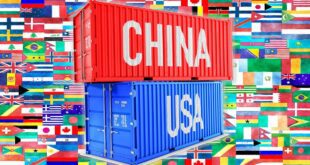While the danger of loss of wealth due to the holding of bank notes is not imminent…it is better to make a move  well in advance of a loss than to make the decision even one day too late. Here’s what could happen as the Great Unravelling progresses and how to protect yourself from those eventualities.
well in advance of a loss than to make the decision even one day too late. Here’s what could happen as the Great Unravelling progresses and how to protect yourself from those eventualities.
The above are edited excerpts from an article* by Jeff Thomas (internationalman.com) entitled Understanding Hyperinflation.
The following article is presented by Lorimer Wilson, editor of www.munKNEE.com (Your Key to Making Money!), www.FinancialArticleSummariesToday.com (A site for sore eyes and inquisitive minds) and the FREE Market Intelligence Report newsletter (register here; sample here) and has been edited, abridged and/or reformatted (some sub-titles and bold/italics emphases) for the sake of clarity and brevity to ensure a fast and easy read. This paragraph must be included in any article re-posting to avoid copyright infringement.
Thomas goes on to say in further edited excerpts:
There will be a number of risks in holding wealth in bank notes, but three main categories are likely in the coming years:
1. Loss Due to Confiscation
As predicted, the bail-in in Cyprus was intended as a trial run and will subsequently be implemented on a larger scale. Since that time, other countries [such as Canada] have quietly passed legislation to allow bail-ins by banks. The bail-in for the EU is officially slated for implementation in January 2016, but this date could be moved up without notice.
2. Loss Due to Inflation
Inflation has traditionally been defined as “an increase in the amount of money in circulation.” In recent decades, this definition has come to mean “an increase in the costs of goods and services.” The latter definition has become common, as it is almost invariably a by-product of the former. Typically, in an economic downturn, wage increases fail to keep up with increases in the cost of commodities, effectively lowering the standard of living for most people.
3. Loss Due to Hyperinflation
Here’s the big one—the economic state that is most feared, yet least understood. Hyperinflation is generally thought to be an extension of inflation, i.e., inflation that has “gone too far.” The danger in perceiving hyperinflation in this way is that it suggests that all a government need do is turn off the money tap—diminish the amount of currency pouring into the system—and hyperinflation can be controlled and therefore avoided – but this is not the case. Hyperinflation is not an expansion of inflation; it is a separate condition. The finest description of hyperinflation I have yet encountered was penned by Harry Schulz and published in his HSL newsletter in September of 2010:
Hyperinflation is the loss of faith in the currency. Prices rise in a hyperinflationary environment just like in an inflationary environment, but they rise not because people want more money for their labor or for commodities, but because people are trying to get out of the currency. It’s not that they want more money; they want less of the currency: So they will pay anything for goods, which are not the currency.
In understanding Harry’s description, it is helpful to recall Weimar Germany, in November 1923, when a loaf of bread was valued at between three billion and twenty billion marks. A story from that time tells of a shopper bringing a wheelbarrow of bank notes to a baker, leaving it outside whilst he negotiated the bread price with the baker. When he went outside, he found he had been robbed—the bank notes had been dumped on the sidewalk and the wheelbarrow had been stolen. This is a fine illustration of Uncle Harry’s description of the desire to be rid of currency notes in favour of something more tangible.
At that time in Germany, it became normal for factory workers to be paid their wages twice or more daily. They would then immediately leave work and rush to buy goods from the shops, as, if they waited until the end of the day, their wages would already have had less purchasing power.
All very interesting, but of what importance is the above to us today? The importance lies in the understanding that, whilst governments may indeed be able to control inflation to some degree, they cannot control hyperinflation. Hyperinflation occurs in the people of a country. It is their reaction to a fear of the government and its depreciating currency. The greater the inflation, the greater the fear, the greater the desire to be rid of the currency, in favour of virtually anything of actual, tangible worth.…This is an economic given that has remained true throughout the ages. As governments misunderstand the nature of hyperinflation, they fail to prevent it and then fail to address it in a meaningful way once it sets in.
Should there be a crash in, say, the bond market and/or stock market, the principle governments of the world will most assuredly create inflation in order to avoid deflation. At some point, as the prices of commodities rise dramatically, [every country’s citizenry] will realise that the depreciating currency notes are a growing liability. Once this occurs, it’s too late for any government (even a responsible one) to attempt to reverse the condition.
What to Do?
Of course, the very suggestion that those internationalising divest themselves of their currency notes seems an impossibility. One cannot pay for his/her groceries with a Krugerrand. One cannot buy gasoline at the pump with a handful of dirt from his/her real estate investment so, therefore, one must have some cash, and, for this reason, loss cannot be avoided. It can, however, be minimized. If, for example, an individual’s wealth (however large or small) were held primarily in real estate and precious metals outside of his/her home country, he/she could:
- additionally maintain, say, three months’ expense money in a currency that is usable where he/she lives. Each month, (assuming the amount were not topped up through income), he/she could cash in a bit of gold to top it up. By so doing, if hyperinflation were likely to be imminent, he/she would still protect the great majority of his/her wealth from loss.
- investing in a currency that is likely to crash later than others. It is likely that the yen will be in crisis before the euro, which in turn may be in crisis before the U.S. dollar. Each of these is likely to be in trouble before the Norwegian krone. Therefore, holding the krone and periodically converting portions to the currency in use where you live, as needed, would ease the nuisance of cashing in precious metals monthly.
Unquestionably, though, it’s a nuisance to ride the fence as described above. It also carries conversion charges along the way. However, it is preferable to sudden (and possibly total) loss.
Conclusion
It is important to bear in mind that hyperinflation generally does not last long. It rises alarmingly quickly, resulting in a crash. It is then replaced by another currency, hopefully a more stable one. It is wise to assume that, should hyperinflation occur, as it is projected to do, your home currency may well go to zero. What cannot be predicted with any accuracy is when this will occur.
Although it may not seem so, we are now in the “quiet time” before the storm—a time in which to prepare.
Editor’s Note: The author’s views and conclusions in the above article are unaltered and no personal comments have been included to maintain the integrity of the original post. Furthermore, the views, conclusions and any recommendations offered in this article are not to be construed as an endorsement of such by the editor.
*http://www.internationalman.com/articles/understanding-hyperinflation (Copyright © 2014 Casey Research, LLC.) When you are dealing with a desperate government, it is always better to be proactive than reactive. International diversification is your ultimate insurance policy. You can find specific and actionable guidance from Casey Research on this critically important topic—so that you can take action before it’s too late—by clicking here.
Related Articles:
1. 21 Countries Have Experienced Hyperinflation In the Last 25 Years
Hyperinflation is not an unusual phenomenon. 32 countries have experienced hyperinflation over the last 100 years of which no less than 21 have experienced it in the past 25 years and 3 in the past 10 years. The United States is one of the few countries to have experienced two currency collapses during its history (1812-1814 and 1861-1865). Could it happen again? Read More »
2. Where Does Your Country’s Currency Rank?
Below is the list of the top 10 strongest currencies in the world, as measured by their percentage of the foreign trade market based on their combined interest in the world’s 3 foreign exchange markets. Read More »
3. Don’t Forget China When Formulating A Diversified Secure Financial Strategy
It is well known that holding uncorrelated asset classes in our investment portfolio gives diversification benefits. In the same sense, diversifying among competing or rival countries or jurisdictions helps to maximize freedom by mitigating political risk. This article discuss the merits, and ease of, diversifying in a country that virtually all have never given a second thought, let alone an initial one. Read More »
4. Here Are the Many Benefits of Having a Bank Account in Hong Kong
Hong Kong is an excellent place to bank. One of the best in the world, in my opinion. Why? Because the banks are strong, stable, innovative, and well-capitalized [and account holders] are free to choose what currency to accept (and save), whether HK dollars, US dollars, Chinese Yuan, gold, or anything else. Read More »
5. A Hypothetical Look At What Could Possibly Be In Store for the U.S.
The economic condition of the country continues to decline toward its rendezvous with an, as yet, unknowable catastrophe. As economic and political matters become more desperate, so will what the government considers acceptable. If a debt default cannot be engineered via continuous inflation, it will occur via a direct repudiation of obligations or a quasi-surreptitious one like the hypothetical one presented in this article…a look (not a prediction) at a series of not improbable events that could develop [and which] would change our economic world overnight. Viewed from this perspective, I don’t think such a move or something approximating it is out of the question. Words: 1300 Read More »
6. Canada & the European Union Are Proposing Cyprus-style “Bail-ins” for Their Too-Big-To-Fail Banks!
The politicians of the western world are coming after your bank accounts. Cyprus-style “bail-ins…for systemically important banks” are actually proposed on pages 144 and 145 of “Economic Action Plan 2013” in the new Canadian government budget and it is being reported that the European Parliament will soon be voting on a law which would require that large banks be “bailed in” when they fail. …I can’t even begin to describe how serious all of this is. So exactly what in the world is going on here? Words: 1075 Read More »
7. 15 Questions & Answers Regarding Hyperinflation
It is difficult to say exactly when hyperinflation will hit a currency. However, I am convinced that the danger level is so high for most fiat money that it is worthwhile for everyone to increase their understanding of hyperinflation. This is the first part of a Hyperinflation FAQ for frequently asked questions or objections about hyperinflation. Words: 1600 Read More »
8. Will Hyperinflation Happen in America? Here Are Economic & Political Worst Case Scenarios
I have been reading a lot lately about the coming hyperinflation in America… [and while] I respect many of the writers [who express that opinion] I think they are jumping the gun. At this point none of the economic or political factors required to set off hyperinflation are present – and a careful analysis of theory, fact, and history leads me to conclude that inflation/stagflation is our future. It is quite a leap of fancy to say we are certain to have hyperinflation. Words: 2780 Read More »
 munKNEE.com Your Key to Making Money
munKNEE.com Your Key to Making Money


